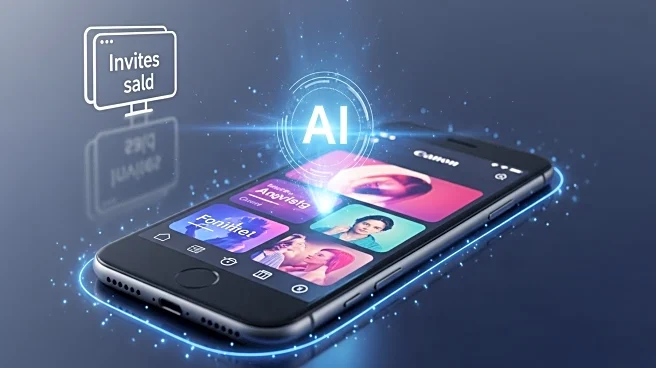What's Happening?
Sora AI has introduced a new social media platform that is gaining significant attention due to its AI-generated video capabilities. The app allows users to create lifelike videos by scanning their face and voice, placing their virtual selves in various scenarios such as speaking at rallies or DJing in front of large crowds. This feature has sparked a viral trend, with users eager to see themselves and their friends in imaginative situations. The app includes a TikTok-style feed where users can consume, remix, and share these AI-generated clips. The popularity of the app has led to a high demand for invites, which are being sold on eBay for under $50. Sora AI has capped the number of videos users can create in a 24-hour period at 30, adding to the exclusivity and demand.
Why It's Important?
The launch of Sora AI's social media app represents a significant shift in the way users interact with digital content. By integrating AI technology to create personalized and engaging videos, Sora AI is tapping into the growing market for creative and interactive social media experiences. This development could challenge existing platforms like TikTok and Instagram, as users seek new ways to express themselves and connect with others. The app's ability to generate realistic videos quickly and efficiently may also influence the valuation of companies like OpenAI, which is already considered highly valuable. As tech investors show interest in Sora AI, the app's success could lead to increased investment in AI-driven social media technologies.
What's Next?
As Sora AI continues to gain traction, it is likely that the app will expand its features and user base. The current cap on video creation may be adjusted to accommodate growing demand, and additional functionalities could be introduced to enhance user engagement. Tech investors and companies may closely monitor Sora AI's progress, potentially leading to partnerships or acquisitions. The app's impact on the social media landscape could prompt existing platforms to innovate and integrate similar AI technologies to remain competitive. Additionally, regulatory scrutiny may arise as the app's use of personal data and likenesses becomes more widespread.
Beyond the Headlines
The ethical implications of using AI to generate videos featuring real people's likenesses and voices are significant. Concerns about privacy, consent, and the potential for misuse of personal data may arise as the app becomes more popular. Users and regulators may need to address these issues to ensure that the technology is used responsibly and ethically. Furthermore, the app's ability to create realistic videos could blur the lines between reality and digital content, raising questions about authenticity and the impact on societal perceptions.









